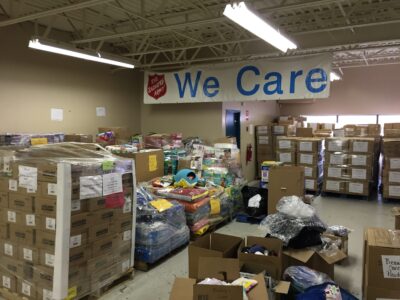The most noticeable part of the Salvation Army’s emergency disaster services is the meals and drinks provided to disaster survivors and emergency responders. These delicious offerings might be prepared and served at welcoming congregate feeding sites like community centres, Salvation Army facilities, camps, or shelters. Sometimes, they are delivered from one of the Army’s mobile canteens known as Community Response Units (CRUs). These CRUs are thoughtfully located in different communities to ensure a quick and effective response whenever needed.
Services
Emotional & Spiritual Care includes spiritual comfort and emotional support to those impacted by the incident, their families, as well as emergency first-responders coping with the stress of a disaster. This support may include comforting the injured and bereaved, conducting memorial services, and providing chaplaincy services. Emotional & Spiritual Care respects all faiths and traditions.
In addition, individual, family and group trauma intervention and emotional support may be available through trained personnel and Critical Incident Stress Management (CISM) teams.

During a major disaster, the generosity of Canadians enables The Salvation Army to solicit and distribute donated goods. Additionally, The Salvation Army may be tasked with the collection, sorting and distribution of in-kind donations, including but not limited to: food, clothing, cleaning supplies, hygiene supplies, furniture, or personal protective equipment.
We may elect to purchase and distribute basic commodities (food, water, medicines, etc.) not readily available at the time of need. Financial donations are the best way for the public to assist The Salvation Army during a disaster. This is because:
- It allows for a rapid response (i.e. money can be sent immediately)
- Ensures we can purchase exactly what is needed and when it is needed
- Supplies are purchased as close to the impacted community as possible to help offset economic losses caused by the incident
Donations are gratefully accepted online at: www.SalvationArmy.ca/emergency or by calling 1-800-SAL-ARMY (725-2769).

The Salvation Army may provide direct financial assistance to disaster survivors. In the early phases of a disaster event, emergency financial assistance is focused on survivors’ essential needs: food, clothing, shelter, and medications. Assistance may be provided through vouchers or gift cards.
In addition, The Salvation Army may provide clothing, usually through vouchers to our thrift stores, or other essential items, such as hygiene kits.

With a presence in over 400 communities across Canada, The Salvation Army can provide both immediate emergency assistance and long-term recovery help. Long-term recovery is strategically planned in response to the situation, through working and partnering with many other community entities.
Following a major disaster, support may be required for months or years. The Salvation Army’s role in long-term recovery may include provision of clean-up kits, opening a Disaster Assistance Centre or providing case management. This support may be provided by Emergency Disaster Services personnel or transitioned to pre-existing Salvation Army operations such as Community and Family Services.

Additionally, the Salvation Army may assist or manage a Reception Centre to provide emergency social services to displaced individuals. These additional services can include providing lodging, registration & inquiry & personal services.
